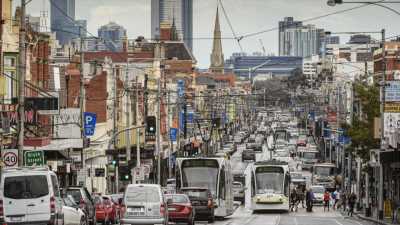Victoria’s peak infrastructure body has called on the government to reduce or remove compulsory minimum parking requirements for developments.
In a major new report, Infrastructure Victoria said the change to car-parking requirements would improve choice and affordability of new homes in established areas close to good public transport.
Kai Brach, pictured with fellow Nightingale Brunswick resident Christa Orcullo, said he shouldn’t have to pay for a parking spot he wouldn’t use. Credit:Eddie Jim
Infrastructure Victoria chief executive Jonathan Spear said planning provisions required people to have more parking than they actually needed.
“There’s minimum standards for the number of parking spaces and the more parking spaces you have, of course, the more expensive the property,” he said.
“We think that this is a missed opportunity because it’s actually reducing the ability to deliver low-rise, higher-quality, affordable apartments in Melbourne.”
The Infrastructure Victoria report also called for fast-tracked planning approvals for townhouses; relaxed zoning to permit more low-rise apartments; and the abolishment of stamp duty and first-home-buyers subsidies to increase housing options and affordability in Melbourne.
Spear said minimum parking requirements should not be removed altogether but should be set at a lower level.
“If we do that, then it’s going to both improve the number of low-rise apartments that reduce their costs, but also give people some encouragement to actually try other forms of transport as well that aren’t car-based,” he said.
However, Dean Hurlston of Ratepayers Victoria, said removing car parking from planning application requirements was “forced coercion” and did not work.
“It does not reduce one car on the road, it simply burdens our existing streets with cars and nowhere to go,” he said. “We are worried it will create ‘carmageddon’ there is just nowhere you are going to be able to park. You look at inner-city areas like Richmond, South Yarra, they are already a basketcase if you live there.”
The Planning Institute of Victoria said a more holistic approach was needed than that proposed by Infrastructure Victoria because the provision of car parking in developments affected neighbours and the broader community.
Patrick Fensham, a partner at SGS Economics and Planning and a member of the Planning Institute, said if car parking was reduced there should be an extra levy on the development to cover offsite impacts.
“The reason why we have car parking requirements in planning schemes is because at least there’s some calibration of the demand that might be generated for car parking in terms of what the streets can cope with,” he said.
Fensham said car parking was a “hot-button issue” for planners with no easy solutions.
Removing parking can have environmental and cost benefits.Credit:Eddie Jim
“You would not believe how many conversations come back to parking in planning,” he said.
RMIT research in 2018 that there were 40 per cent more parking spaces in Melbourne CBD apartment buildings than cars owned by residents.
Green developer Nightingale is one developer in Melbourne already building apartment blocks without any parking spots. It says that shaves $50,000 to $70,000 off the cost of each home.
That was a key attraction for Kai Brach when he bought his apartment in the Nightingale Brunswick building in July 2022. The magazine publisher does not own a car, mostly gets around by bike or public transport, and sometimes uses the car-share scheme vehicles in his building.
“I made a conscious decision not to use cars for various reasons – for the environment plus financial – and I don’t want to be punished for that,” he said.
Brach said some residents in his building who did own cars rented parking spots in an apartment building nearby.
“Living in a very dense suburb of Brunswick, there’s lots and lots of car parking underground and many times it’s half empty. So if you want to find a public car park, you can,” he said.
Nightingale chief executive Dan McKenna said the developer was taken to the Victorian Civil and Administrative Tribunal over its developments in Brunswick and Fairfield after locals objected to the lack of car parking.
McKenna said removing parking had environmental and cost benefits.
“What we do is bring that conversation to potential homeowners and say: ‘We could build a basement. We could dig two, three levels down. But that is going to cost you $50,000, $60,000 or $70,000’, depending on where the project is,” he said.
“When you put it in front of people in such a way, for people who are super price sensitive – which is everybody at the moment – it’s a really easy discussion to have.”
McKenna said Nightingale developments next to train stations and bike paths typically had no car parking and instead residents received a car share membership and partnership with ebike service Lug & Carry.
“There are mechanisms and tools put in front of people at the outset before they become residents and then it’s a bit of a leap of faith,” he said.
“Overwhelmingly we see this freedom once people do take that leap and come into our buildings.”
The Morning Edition newsletter is our guide to the day’s most important and interesting stories, analysis and insights. Sign up here.
Most Viewed in National
From our partners
Source: Read Full Article


